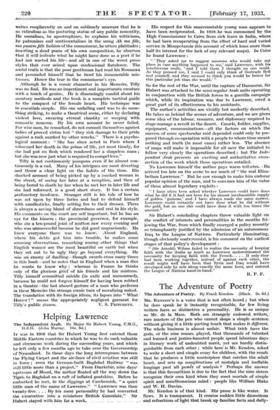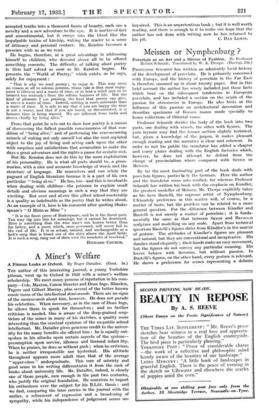The Adventure of Poetry
The Adventure of Poetry. By Frank Hendon. (Black. 2s. ficL) MR. KENDON'S is a voice that. is not often heard ; but when he does speak he is 'instantly recognizable, for few !icing. writers have to distinctive a personality. He is as unique: as Mr. de la Mare. Both are strangely endowed writers, rare masters Of the pen who cannot shape a simple sentence , -without giving it a little parting touch that makes it different.. The whole business is almost unfair. What trick have the gods, or the nine muses, played, that thousands of talented and learned and justice-haunted people spend laborious days - in literary work of undoubted merit, yet are hardly distin- guishable from each other ; while here is Mr. Kendon, asked' to write a short and simple essay for children, with the result that he produces a little masterpiece that catches the adult heart, and sets up complications of nostalgia and ineffable longings past all pow& of analysis ? Perhaps the answer is that this favouritism is due to the fact that the nine sisters recognize their own kind when they meet mortals of simple spirit and unselfconscious mind : people like William Blake and W. H. Davies.
Mr. Kendon is of that kind. -His prose is like water. It flows. It is transparent. It creates sudden little dissections and refractions of light that break tip familiar facts and dully.
accepted truths into a thousand facets of beauty, each one a novelty and a new adventure to the eye. It is matter-of-fact and unsentimental, but it creeps into the blood like the impalpable toxins of kinship, waking the reader to a sense of intimacy and personal contact. Mr. Kendon becomes a presence with us as we read.
. He begins, therefore, at a great advantage in addressing himself to children, who demand above all to be offered something concrete. The difficulty of talking about poetry is thus half solved as soon as Mr. Kendon begins. He presents. the "World of Poetry," which exists, as he says, solely for enjoyment : !` That is why we read poetry ; to enjoy it. This may seem no reason at all to solemn persons, whose rule is that most enjoy. ment is idleness and a waste of time, or at best a relief (not to be treated too seriously) from the solemn business of life. But the kind of pleasure I um praising, the kind that poetry can give, is never a waste of time. Indeed, nothing is more miserable than a waste of time. It is safe to say that if you are happy the time is not a waste, and that if you are bored, or discontented, it is because rimy is being wasted. We are different from rocks and stones chiefly by being alive."
From that point lie sets out to show how poetry is a means of discovering the fullest possible consciousness of that con- dition of "being alive," and of performing the ever-recurring miracle of waking not only oneself but also the contemplated Object to the joy of living and acting each upon the other with surprises and satisfactions that accumulate to make the days a great adventure and the nights a pause for ecstatic rest.
But Mr. Kendon does not do this by the mere exploitation of' his personality. He is what all poets should be, a gram- marian, with a nice and accurate knowledge of words and the structure of language. He remembers and can relate the pageant of English literature because it is a part of his own particular "being abve." He has, too—and this is invaluable when dealing with children—the patience to explain small details and obvious meanings in such a way that they are exciting. But over and above this gifted school-mastership is a quality as indefinable as the poetry that he writes about. As an example of it, here is his comment after quoting Shake- speare's "0 Mistress Mine " : "It is the finest poem of Shakespeare, and he is the finest poet. You may dig into this for meanings, but it cannot be destroyed. Here is something that the wise man's son knows better than his father, and a poem which, once possessed, will never fail to the end of life. It is as actual, natural, and unchangeable as a lark's song that is heard out of the skies above the April fields. It is such a song, sung out of skies over the meadows of m.nkind."
RICHARD CHURCH.







































 Previous page
Previous page